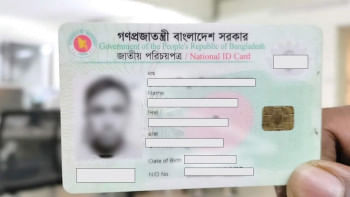Banning party activities: Govt amends anti-terror law

The interim government is set to bring the curtain down on the Awami League as a functioning political party.
The advisory council in a meeting yesterday approved an ordinance to amend the Anti-Terrorism Act-2009 so that it can ban all the activities of any entity.
Chief Adviser Prof Muhammad Yunus presided over the meeting at his official residence, Jamuna. The law ministry later published the Anti-Terrorism (Amendment) Ordinance, 2025.
The government is expected to issue a circular banning the Awami League's activities anytime now.
The election commissioners would then sit to decide whether to revoke the party's registration and bar it from elections.
The 2009 Act allows the banning of an entity, but does not contain any provision regarding the prohibition of an entity's activities.
After the latest amendment, section 18 (1) now authorises the government to "ban all activities of any entity".
The amended section 20 reads, "[The government] will ban publishing or printing any press statement by or on behalf of that entity, or organising any sort of publicity on mass media, online, social media or other media, procession, rally, gathering or press conference, or giving a public speech."
The Council of Advisers on Saturday decided to ban all activities of the Awami League under the Anti-Terrorism Act until the International Crimes Tribunal completed the trial of the party and its leaders for atrocities during the July uprising.
The ban aims to "ensure national security, protect leaders and activists of the uprising, and safeguard plaintiffs and witnesses involved in the tribunal proceedings", Law Adviser Asif Nazrul said on Saturday.
The decision to ban the Awami League's activities came after three days of demonstrations by the National Citizen Party (NCP) and several other political and student organisations.
Hundreds of people, including women and children, were killed during the uprising.
A fact-finding mission of the Office of the United Nations High Commissioner for Human Rights estimates that as many as 1,400 have been killed.
In a report in February, the mission said "serious human rights violations and abuses" committed by the security forces and armed Awami League supporters between July 15 and August 5, 2024, stemmed from a calculated effort to retain power at all costs.
Ousted prime minister and Awami League chief Sheikh Hasina fled to India on August 5. Most of the party's top leaders are either hiding abroad or are in jail.
Formed in 1949, the Awami League is one of oldest political parties in the country. Earlier, in October last year, the government banned the party's student wing, Bangladesh Chhatra League, under the Anti-Terrorism Act-2009, amid demands from the student movement against discrimination.


EC DECISION AFTER GAZETTE
Asked about the fate of the Awami League's registration with the Election Commission as a political party, Chief Election Commissioner AMM Nasir Uddin told The Daily Star that they would decide on the matter after officially receiving the government circular banning the party's activities.
"No decision on the matter can be taken without the government's circular, which must be taken seriously. Once we receive the exact order, we will review the legal aspects and determine the next steps accordingly," he added.
Election Commissioner Anwarul Islam Sarker told this newspaper yesterday that the commission would hold a meeting as soon as it got the circular.
EC officials said the commission was prepared to hold the meeting today. "It is almost certain that the commission will not go against the government's decision," said a highly placed source at the EC.
Since 2008, a total of 50 political parties have been registered with the EC, while five parties' registrations have been cancelled.
The Freedom Party's registration was cancelled in 2009 as it failed to provide the party charter.
The Jamaat-e-Islami's registration as a political party was declared illegal by the High Court in 2013. Following the verdict, the EC cancelled Jamaat's registration in October 2018. Jamaat's appeal against the High Court verdict is now pending with the Appellate Division of the Supreme Court.
After 2018, Oikyabaddho Nagarik Andolan, Pragatashil Ganatantrik Party and Jatiya Ganatantrik Party lost their registrations as they failed to fulfil certain conditions.
HISTORY OF BAN
Throughout Bangladesh's political history, various parties and organisations have faced bans.
After independence, all religion-based political parties, including the Jamaat, were banned following the adoption of the country's constitution in 1972.
In a sweeping political move on January 25, 1975, Bangabandhu Sheikh Mujibur Rahman dissolved all political parties, including the Awami League, and introduced one-party rule under Bangladesh Krishak Sramik Awami League or BAKSAL. Following his assassination on August 1 5 the same year, all political activities were suspended under martial law.
Political activities resumed in 1976 following the lifting of the ban. During this time, some leaders revived the Awami League. In 1979, the then-government allowed all previously banned parties, including the Jamaat, to re-enter the political arena.
During the Awami League's tenure in 2013, the High Court revoked the Jamaat's registration. Last year, the government banned the Jamaat and its student wing, Islami Chhatra Shibir, under the Anti-Terrorism Act. After the July uprising, the interim government lifted the ban in August.
Several organisations, including Purbo Banglar Sarbahara Party and the Purbo Banglar Communist Party, were banned under the 1974 Special Powers Act.

 For all latest news, follow The Daily Star's Google News channel.
For all latest news, follow The Daily Star's Google News channel. 





Comments